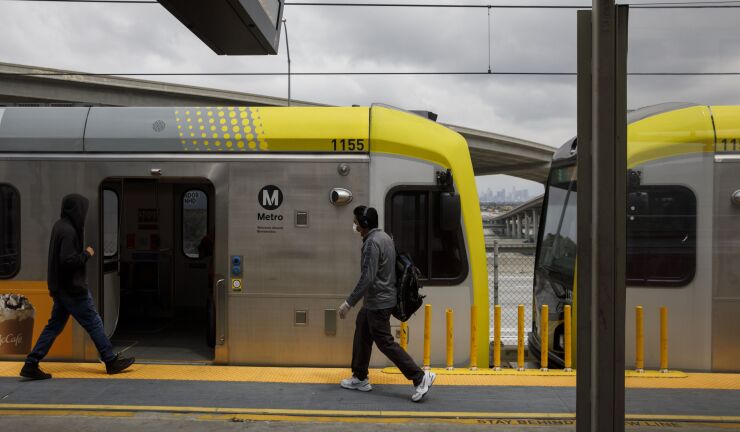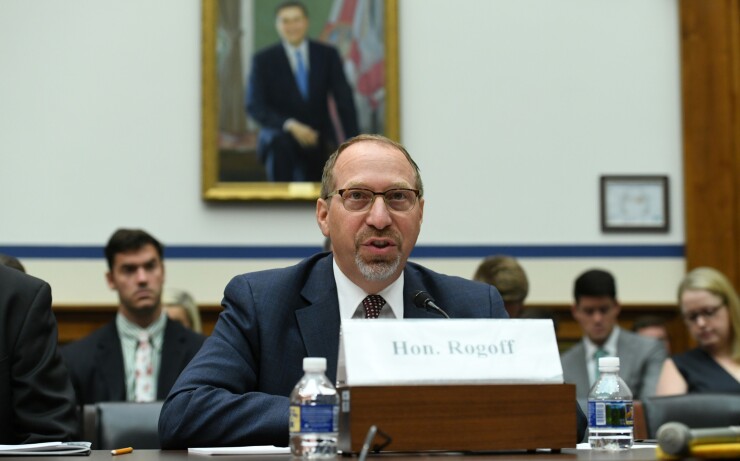A national coalition of public transportation agencies is lobbying the U.S. Senate for up to $36 billion in additional rescue aid to counter the effects of COVID-19.
“Joining together across the nation will make our voice louder and cause even clearer,” Patrick Foye, chairman of New York’s Metropolitan Transportation Authority, said during Tuesday’s videoconference call that featured several transit agency heads.

They shared tales of woe related to plummeting revenue from ridership drops due to stay-at-home measures to combat the coronavirus and the loss of a variety of dedicated tax revenues.
Overall, 27 heads of transportation agencies, many of whom spoke online Tuesday on what was billed as a "virtual rally," signed a
“It’s hard to overstate the size and challenge of the deficits, and the agencies that are gathered here today are facing different challenges. We’ve got different revenue sources, different financial conditions, but we’re all under extreme pressure,” Foye said.
New York MTA has requested $3.9 billion of aid to match what it received in April under the CARES Act. According to Foye, the MTA will receive its last CARES installment in early August.
The MTA, one of the largest municipal issuers with roughly $47 billion of debt, has received multiple downgrades since the pandemic hit, most recently from S&P Global Ratings last week, which Foye called “sobering.” S&P
“The S&P report makes the case for additional federal funding,” Foye said.
Los Angeles County Metropolitan Transportation Authority projects a $1.8 billion loss over two fiscal years, said chief executive Phillip Washington, who said expenses are going up as revenue falls.
Daily ridership across the system, which serves the nation’s largest county, has dropped from 1.2 million pre-coronavirus to 550,000, although riders are starting to return.

The Philadelphia-based Southeastern Pennsylvania Transportation Authority’s capital program is at risk, General Manager Leslie Richards said. That program, she said, contributes more than $1 billion annually to Pennsylvania’s economy.
“We’re preparing for a number of potential scenarios that could delay or halt important state-of-good repair projects,” Richards said. Without further federal aid, she added, shortfalls could run up to $800 million through fiscal 2023.
Seattle’s Sound Transit receives no state funding, according to CEO Peter Rogoff. “There are some people who have asserted that this problem should be a state and local matter," he said.
"[But] King County Metro and the other transit providers get a pittance. Sound Transit gets zero money from the state; we are highly dependent upon sales taxes and motor vehicle excise taxes to cover at least 70% to 80% of our costs as a region. So you can imagine what has happened,” he said.
Federal aid will enable long-term projects to continue, said Randy Clark, CEO of Capital Metro in Austin, Texas. There, the City Council and Cap Metro’s board last month approved a $10 billion expansion plan called Project Connect.
“I look at this pandemic as being incredibly significant but still measured in months, and I don’t know if this is six months or 18 months, the heart of this pandemic,” Clark said.
“But transit, what we do and the benefits in our community are measured in years and decades and generations, whether it’s Pat’s tunnels in New York City that were put in in 1905 and they’re running trains through them today, or the projects that Cap Metro is working to advance to grow our community.”
The crisis has forced the Greater Cleveland Regional Transit Authority to “be more agile, innovative, customer-focused and strategic” said acting CEO Floun’say Caver. “We’ve gained a greater understanding of ridership patterns, learned to increase and modernize our cleaning protocols, and I’m excited about the future of public transit in this new environment,” he said.
Still, said Caver, an infrastructure backlog remains.





